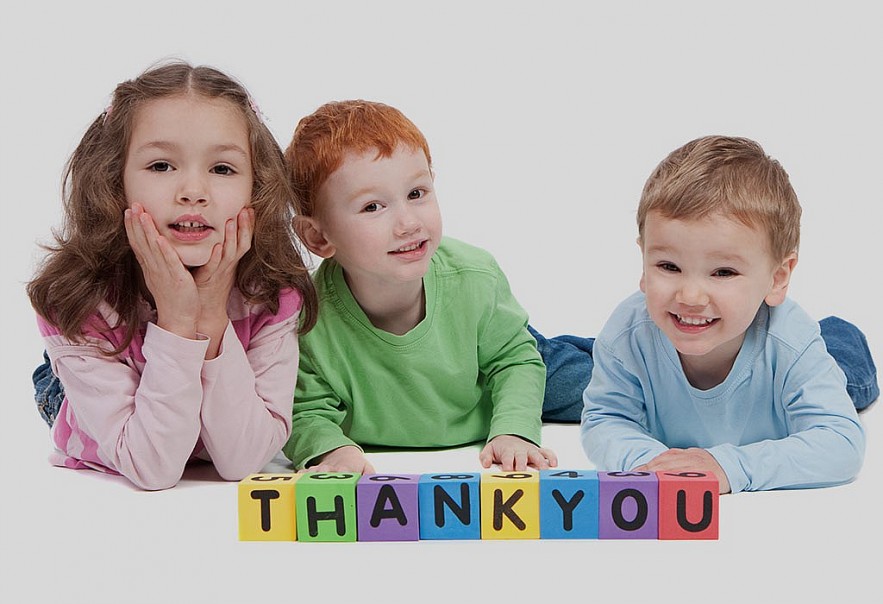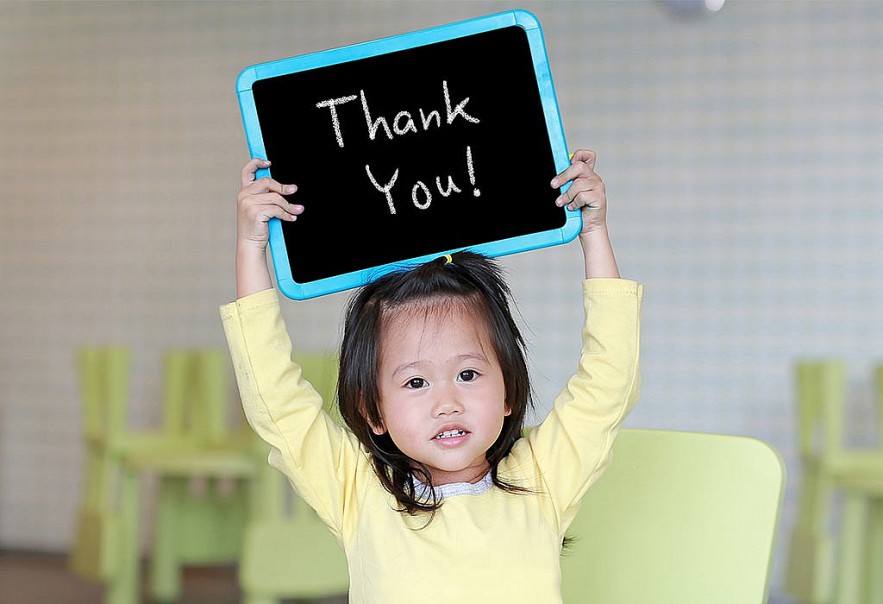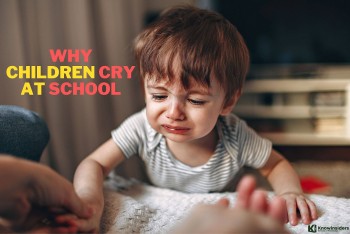Useful Tips: Teach Children to Say 'Thank You' and Gratitude
 |
| Ways to Teach Gratitude to Children |
When the young girl opened the gift box at a baby's birthday celebration close to my home and exclaimed, "Oh, it's the clothes again, why is it so boring?," I unintentionally saw the sad scene. making the parent who brought the gift and the parent who brought the gift feel very embarrassed. At this point, screaming at the child won't help and might even make things worse.
Therefore, in order to prevent ending up in a situation like the one described above, parents must teach their kids to say thank you and to express gratitude for any gifts they receive.
Explain the meaning of thank you to children
Life is always full of suffering no matter how talented you are if your personality does not match. As a result, parents must always be aware that teaching their children to be grateful is just as important as providing them with knowledge.
Perhaps your child will wonder, "Why, why thank you for something I don't like?" when you say, "When you receive a gift, even if you don't like it, say thank you."
As a result, if you want to teach children to say thank you, you must first explain what "thank you" actually means. For example, if you teach your child that when other people give me a gift, it is a way for them to show that they care about you, that they love and cherish you, rather than just an item.
As a result, the nature of the gift is unimportant; when we accept the gift, we are receiving the heart of another, and we should respect that.
True gratitude allows you to see the value in everything in your world. As a result, parents should not be able to determine whether a gift is expensive or inexpensive enough to entice children to imitate. Instead of commenting on whether the gift is expensive or inexpensive, large or small, parents should show the child the meaning behind the gift.
For example, teach your child how to prepare a gift in which they must put their heart, effort, and time.
Practice saying thank you as soon as possible
Don't wait until your child accepts gifts and "embarrasses" you before teaching them how to say thank you. Let's start training your child early so that gratitude develops and becomes a good habit.
You do not have to wait until your child can speak to be guided. Instead, when you have the chance, you say things like, "Thank you for the sun shining on us, thank you for the refrigerator." help the food last longer, thanks to the flower for making the room more beautiful,...
Gratitude can be instilled in children and developed into a habit in adults. We can teach children from everyday experiences rather than waiting for them to receive a gift or be in a specific situation.
Later, when the child is older, before eating, ask the child to thank you for preparing the meal, or when someone assists the child with any task, the child should also thank them.
Don't forget to praise and encourage your child whenever he or she knows how to say thank you to someone else. Babies enjoy being praised and making their parents happy. When you see your child obeying and making more progress, praise him so that he can be happy and try again the next time.
Then it's time to accept gifts, instruct them to smile, and thank you. Prepare simple small gifts for your child every day, giving them a thank-you guide each time to focus on teaching them gratitude.
 11 Easy Ways To Teach Stubborn Children To Obey 11 Easy Ways To Teach Stubborn Children To Obey To deal with stubborn and self-willed children, you just need to listen to them, understand them and have the right teaching methods. Check out top ... |
Encourage your child to help others
If simply teaching your child to say "Thank you" is insufficient, let him gradually experience gratitude by letting him assist his parents and those around him.
You can motivate your kids to help out around the house by washing dishes, cleaning the table, watering the plants, etc. They learn independence from this, and it also aids in their comprehension of many abstract concepts. It's impossible to put into words. Children learn that nothing is taken for granted and that their parents are not required to take care of all of their needs when they assist with household chores.
In fact, children who are overpampered and given everything with the attitude that "kids don't know anything" will frequently develop a lack of gratitude as adults. The more opportunities I have to appreciate the efforts of you and those around me, the more I need a guide to understand the efforts that you have made.
If you find it difficult to explain that each gift has value, you can give your child practical experience by shopping for and wrapping adult gifts yourself. This will help your child appreciate how much preparation goes into giving gifts and how much time and effort it takes.
It is best to allow your child to take part in charitable activities because this teaches them about doing good deeds. Help the kids choose unused items like books, toys, clothes, etc. to donate to those in need or encourage them to help those who are harder to help than themselves.
Bring your child, if at all possible, to visit people who are in challenging situations so they can experience life as it is and learn to be kind to everyone.
 |
| Ways to Teach Kids to say thank you |
Don't criticize when you haven't achieved it
When you try to teach your child to say thank you very much but he still struggles to do so when speaking to an outsider in a particular situation, you might feel frustrated. Try to maintain your composure in that circumstance; don't yell to frighten or humiliate your child.
You must realize that your child must practice the skill repeatedly over a long period of time before becoming proficient. As a result, parents need to be patient with their kids. When you realize how crucial this is, don't be afraid to reiterate it repeatedly.
Scientific research has shown that kids don't really grasp the meaning of gratitude until they're 8 to 10 years old. Children under this age are still accustomed to speaking honestly about their feelings, so you still need to be patient and considerate when teaching them rather than irate and critical.
Even if you are not pleased with your child's performance, hold off until you can talk to him in private about his rude behavior and discuss how to avoid it in the future.
 Why Children Cry When Going To School, Tips To Relieve Them Why Children Cry When Going To School, Tips To Relieve Them Holding parents’ hands to enter school and then bursting into tears after saying goodbye to parents. That’s common among children when going to school. Why ... |
Create a habit for your child at any age
We cannot teach our children gratitude when we do not have it. Parents also have to cultivate gratitude, when you return home you can tell your children the funny story of the day, the right decisions instead of complaining about your work.
You must be the one to value life and what you have in order for children to develop the habit of gratitude. Since children learn best by imitating adults, lead by example when it comes to showing gratitude to others. Saying "thank you" and "please" to those around you on a regular basis is the simplest solution.
Additionally, bring up the subject of gratitude every day. For instance, when dining out with your child, say something like, "We are so fortunate that we can eat well and be served warmly. "Love like this!" Additionally, it teaches kids to be appreciative of the smallest, most insignificant things that are frequently overlooked.
Spend some time each day sharing your blessings with others, perhaps at dinner or before bed. Your child can inquire about a relative they don't know well and listen to what they have to say. thanks. That will be the clearest and most useful way to teach kids about gratitude.
Encourage your child to keep a journal of the things she is thankful for each day as she gets older. It has been demonstrated that keeping a journal can make kids happier: One study found that when kids listed their five greatest blessings, they did better in school and felt happier overall. compared to children who were asked to list their top five pet peeves.
By continuing this daily ritual, parents can inspire their kids to consider all aspects of life and count their blessings, helping them to avoid negative attitudes and impulsive behavior. too young and uneducated.
 Fact-Check: The Mysterious Children With Black Eyes Fact-Check: The Mysterious Children With Black Eyes Mysterious children with black eyes have haunted people around the world. Who are they? Why do they have black eyes? What makes them so different? |
 Life Lesson: Useful Tips to Teach Social Skills for Children Life Lesson: Useful Tips to Teach Social Skills for Children Many parents believe that social skills are only used outside of school. In fact, it can be used at any time and in any place, ... |























